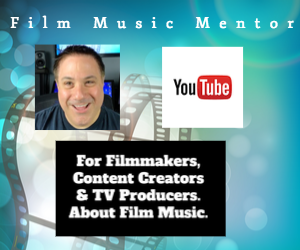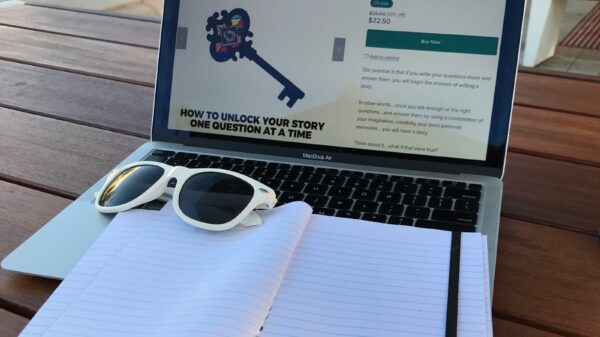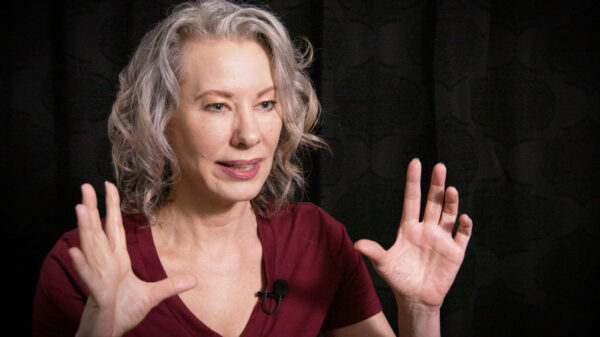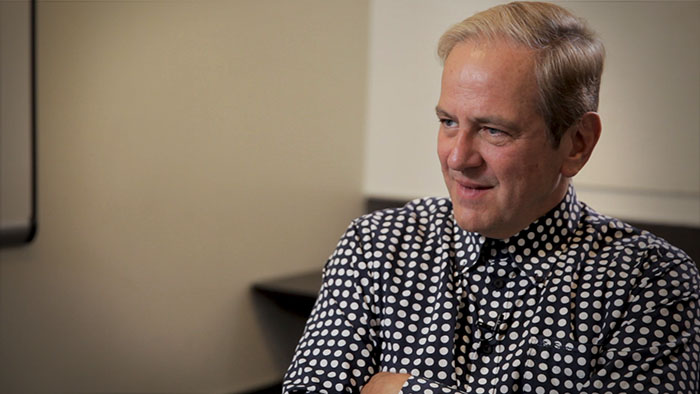
Watch the video interview on Youtube here
Film Courage: So you’re shopping the production around or you’re looking for a production company?
Peter Russell, screenwriter and script doctor: No, it’s been sold to a production company but we want to sell it to Netflix, we want to sell it to somebody else. I want to be involved in that too because I know what a fantastic story this is and it’s just the kind of story that is perfect for a time, for this time.
African American hero which I think is timely. I’m a white guy so I understand that my kind of guys pretty much run Hollywood for a long time, I think it’s time that changed. But the story theme here is about new heroes. So I think it’s about a great chance to show a real guy, you know?
I mean his real life was so insanely cool that you really couldn’t make it up. So it’s great idea and I know it’s going to sell.

Watch the full video interview on Youtube here
Film Courage: Where did you go to start shopping it around (I know you said it’s already sold)? Can you take a step back and tell us?
Peter: Well since it’s happening right now I can’t tell you exactly who we are going to. We’re looking at channels. We’re looking at channels with names that have channel in the name and the big companies. I mean look there are 14 billion dollars now in the two fields, Internet platform. 14 billion dollars chasing stories right now.
And it’s funny Suzy says “Don’t say it’s easy. Not easy to sell anything. It’s so hard and you’ve got to be experienced.” And that’s all true and this isn’t…Hollywood is not…there isn’t streets paved with gold. It’s extremely difficult still to sell anything in this business (it would be silly to say that it’s not). But this is the most exciting time in history for television at least in the US.
Now I’m going over to South Africa in a few weeks to lecture at the Durbin Film Market. I’m also getting remarried (well not remarried but having another ceremony). And the South African television market I think is growing.
I’ve just been working with a guy in Brazil (a big soap opera star) down there who wants to do a serial for Netflix. I think worldwide television is just on fire. But the interesting thing is this miniseries about Jack Johnson. The miniseries form is probably the closest to what television offers. What do I mean by that?
A miniseries like what you’ll see in the ASSASSINATION OF GIANNI VERSACE and TRUST, these are long movies rather than tv serials. Now I’ve just worked on a crime drama serial for television which we can talk about that too.
The miniseries form is like a long movie. Why is that? Because you have wounded characters who at the end of the miniseries have healed or they have bled out (one or the other) but they have an arc and that miniseries arc and that miniseries arc is just like a long movie.
So with Jack Johnson (he’s still a hero) but he still had a journey. So you get a progression in the story.
For instance in the ASSASSINATION OF GIANNI VERSACE you’ve got a wounded guy (Andrew Cunanan was a wounded guy. His dad wounded him and his wound never healed) but he tried to heal. So you saw this…it was like a 7-episode long movie so it had a B.M.O.C. which we can talk about that too [B.M.O.C = beginning, middle, obstacle and climax].
So when I’m writing miniseries (if you’re a movie writer who wants to go into television) you should think about as a transition writing a miniseries because it will give you the opportunity to use all of your movie chops but in a television form that lets you transition into television because you need to have a character or side characters who are bleeding at the beginning, who get mentors and wound rippers all through it and then they learn the theme of the show toward the end and they either heal or die and that’s what a miniseries gives you.
Even a serial television series doesn’t give you. And serial television (obviously) the wounded person just keeps bleeding all through for a hundred episodes. But miniseries offer you the form (a lot of the forms of a movie) in a television setting.
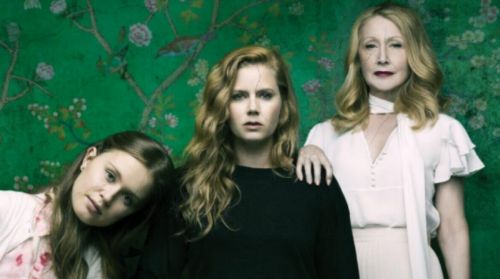
HBO’s SHARP OBJECTS
Film Courage: I know HBO’s SHARP OBJECTS debuted on Sunday (I didn’t watch it…yet) so it’s Gillian Flynn, the writer of GONE GIRL. I guess she wrote this story (because I started listening to some interviews with her) before she wrote GONE GIRL and other stories and it’s about a wounded character (who is a female) and she said “She is very wounded and has issues, but she’s likable.” And she thought it was interesting that it had to be defended for this character that she was likable. Because she said “Well, Walter White [BREAKING BAD] does he have to be likable? Tony Soprano [THE SOPRANOS], does he have to be likable?”
Peter: I would argue they are likable. But sympathetic is actually more important than likability. If you look at Tony Soprano (it’s a good example), it’s old now but I think it’s the most brilliant television ever made. I think if you haven’t seen SOPRANOS you should watch it because it’s still the most brilliant…it’s like Shakespeare.
Tony Soprano is a murderer. He is a horrible human being and yet we love him, why? We love him because he’s got this deep wound in him and it comes from his mother and the entire first season of THE SOPRANOS is about this horrible mother and how awful she is to Tony.
And even though when he tries to kill her on the gurney when they’re rolling her out of the nursing home and she’s going “Ha! Ha! Ha! Ha! Ha!” He’s literally trying to get her with a pillow. Our sympathies are with Tony, why? Well, here’s the big secret of the anti-hero which I talked about earlier. Anti-heroes are great guys who turned bad for sympathetic reasons. Michael Corleone becomes a horrible man, why? He’s saving his dad? He’s saving his family.
Tony Soprano is a horrible guy but we like him, why? Because he wants to save his family. The first season of Tony Soprano, the ducks are leaving his pond, his kids are leaving the nest. He’s trying to get his mom saved and into a home. She’s like “Leave me alone. You’re a horrible human being.”

Watch the full video interview on Youtube here
So the great secret of the anti-hero is to make the villain and the people around them worse and less likable than the hero themselves. Tony Soprano’s mom is the most miserable human being ever conceived on television and he says it’s based on his own mom.
We love Tony because his mom is just so awful. And it’s like poor guy, no wonder he turned into a murdering psychopath. His mom is awful. So that’s the critical thing about making someone sympathetic and also a likable yes (that’s important). But to make them sympathetic you make the other people around them worse.
Michael Corleone had to save his dad nobody else would do it. His brother couldn’t do it, he had these terrible villains around him that were shooting his entire family. He had to save family and in doing so he eventually lost his family. Just like Tony Soprano. Tony Soprano ends up killing his nephew, ends up killing all the people around him. Probably ends up having people shot in the final restaurant scene but we have great sympathy for him because we see his wounds. His wounds are everywhere. Wound are why we love a character.
And when you first start out writing a story, show me your hero’s or character’s wounds the second they get on screen. The second they are on screen, show me the wound that’s how you get someone to be likable. You get the note that your character is not likable (which you get all the time from a producer), that’s how to make them likable, show them bleed.

MORE VIDEOS WITH PETER RUSSELL
https://bit.ly/1SXtU22
WATCH PETER RUSSELL’S ANALYSIS OF MR. ROBOT
https://www.youtube.com/watch?v=JY1Dl5ELSPg
MORE BREAKING BAD ANALYSIS
https://bit.ly/2elfcYj
CONNECT WITH PETER RUSSELL
Peterrussellscriptdoctor.com
Facebook
Twitter
Instagram.com
Like this video? Please subscribe to our Youtube channel. Or love this video and want more? You can show additional support via our Youtube sponsor tab (hit the JOIN button on the front page of our Youtube channel in the upper right hand corner or underneath any video if watching on Youtube) or through Patreon.
Advertisement – contains affiliate links:
If you’re not quite ready to let go of the Halloween spirit, new indie feature film Mandao of the Dead is now available on Amazon VOD.
Mandao (Man-Day-Oh) of the Dead is about Jay Mandao and his nephew-in-law Jackson who use astral projection to reverse a ghost’s death on Halloween.
This astral comedy is the second feature film Written and Directed by Scott Dunn and produced by Gina Gomez Dunn. It was filmed in 10 days with a production budget of just $13k. The duo’s first feature film, Schlep won Best Comedy/Dramedy at the Hollywood Boulevard Festival and was nominated in 5 different categories at the FirstGlance Film Festival. Schlep is also available on Amazon. Mandao of the Dead will be released on iTunes and DVD/Blu-ray in January 2019.
Lights, Camera, Save! is a teen video contest that encourages teens to educate themselves and their peers about the value of saving and using money wisely. Each fall students enter the contest by submitting videos to local participating banks. These banks then choose a local winning video and submit it for judging at the national level. No purchase necessary. Void where prohibited.
Film Music Mentor – A Youtube channel for filmmakers, television producers, content creators and media professionals of all kinds. Film Music Mentor will help you circumvent problems even the most seasoned professionals face.
Multiple award-winning composer/music producer Andrew Markus breaks down every challenge that motion picture creators face in the process of putting music in their projects. Why it works and why it fails.
Restraint – A mentally ill woman who’s been submerging her violent impulses for years unravels after she marries a controlling older man and relocates to his suburban home by Adam Cushman







